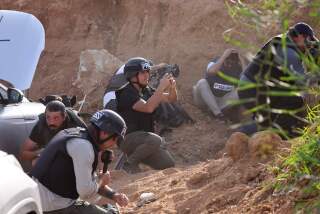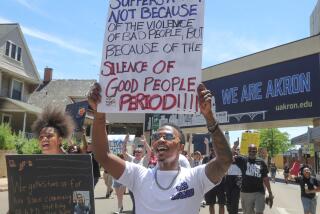American Kosovo Monitor Changes His Image
- Share via
BRAZDA, Macedonia — The U.S. diplomat, wearing a windbreaker and brown corduroys, walked into a Kosovo Albanian refugee camp the other day and was greeted with applause, bearhugs and the chant: “Walker! Walker!”
The outpouring was a tonic for William Walker, who headed an international monitoring mission in Kosovo for six months and exposed the brutality of Yugoslav President Slobodan Milosevic’s troops to ethnic Albanian civilians.
“I now know what intoxicates Fidel Castro when the crowd yells, ‘Fidel! Fidel,’ ” the 63-year-old career foreign service officer said in an interview after visiting refugee camps in Macedonia. “It was moving.”
Walker earned the ethnic Albanians’ affection by putting a spotlight on Serbian actions in Kosovo before the world was paying much attention--and, famously, for accusing Serbian security forces of killing 45 people in the village of Racak in January, and for labeling their act a massacre.
“The people love him because he risked his life to come to a dangerous place like Kosovo and help the people and tell the Americans and the European community the truth,” said Enver Vrajolli, a refugee from Kosovo who was thrilled to see Walker in Macedonia. “I think he’s a strong man with a big heart.”
Reputation Suffered After El Salvador Killings
This reputation as a crusader for human rights represents quite a change for Walker. His tenure as ambassador to El Salvador during its civil war was clouded by his failure to point the finger at government security forces for killing six Jesuit priests, their housekeeper and her daughter in 1989. He was accused of helping cover up for the Salvadoran government, which Washington was backing in the war.
Walker’s friends say he hopes that his performance in the Balkans will help him clean the slate--and perhaps win him another ambassador posting.
But as he rode to refugee camps in his bright orange armored Suburban on Sunday, Walker had his eyes on another honor.
“My one goal in life is to be with the Glenn Fords of the world on the honor roll of famous graduates of Santa Monica High School,” Walker said.
Walker may not make his 45th reunion this June: His team is eager to get back into Kosovo, but it will have to wait until the fighting in Yugoslavia ends.
In the meantime, officials with the Organization for Security and Cooperation in Europe--which is in charge of the Kosovo monitoring team--are supporting the relief efforts in Macedonia and Albania, and collecting information from refugees to assess the ongoing atrocities in Kosovo.
When he entered the Radusha camp, which has the worst conditions of any camp in Macedonia, for the first time, the weary refugees rushed to see him. Their faces brightened, and they applauded him. A cluster of people followed him as he made his way around the camp, talking to refugees and giving brief interviews to journalists.
Later in the day, when his entourage stopped at another camp, his personal assistant tried to direct him through a back way into a tent where a small number of refugees were waiting to be registered for evacuation flights to Germany. Walker resisted, circling around the front of the registration tents so he could show his face to the long line of refugees waiting outside.
The crowd burst into applause, and, as a few people chanted his name, one man approached him, gave him a big hug and kissed his hand.
A member of his staff grumbled about Walker’s love of the spotlight, but Walker put a more positive spin on what motivates him.
“There’s a reason why when I go into camps [that] people start chanting ‘Walker! Walker Walker!’: I symbolize something to the Albanian community in Kosovo, which was this international effort to protect them from the government security forces,” Walker said.
By showing up in the camps, where refugees have no access to newspapers or television, Walker said, he is communicating the continued commitment that the international community has to them and their return to their homeland.
He employed a similar tactic in Kosovo. Rather than sending others, he showed up in villages when there was trouble. With his affable, no-airs manner, Walker impressed the people of the province as someone who cared about their suffering.
Walker had the OSCE’s vehicles painted a showy orange to send a similar message of hope to the innocent--but also one of determined menace to the security forces terrorizing Kosovo.
“Our little orange wagons were seen as a protective screen by Albanians, and they increasingly became seen as a danger to government control,” he said.
“All Albanians are grateful to him, even small children,” said Imer Jashari, 41, who was wearing a UCLA T-shirt. Walker, who studied art at UCLA before studying architecture at USC, selected Jashari from the crowd to register him for possible evacuation to Germany.
Walker tried to encourage the refugees, telling them that they would return to Kosovo, and so would he.
“This insanity can’t go on,” Walker said. “It can’t end with Milosevic getting away with this. So I’m quite optimistic when it ends, the Kosovars will go back and the international community will go with them. The problem is trying to guess at when that’s going to happen. The question I keep getting in the camps is: When can we go back?”
As he left the Radusha camp, Walker said that seeing the people of Kosovo become refugees en masse “makes you feel like you’ve failed in some fashion or another.” But he quickly added that it also steels his determination to see Milosevic defeated.
During brief stops at two refugee camps, Walker talked to a string of television crews representing a wide array of media--from CNN to Israeli television.
Although the impromptu interviews annoy some of his staff, others argue that the media are a major weapon of an unarmed mission such as the monitoring mission in Kosovo.
Walker believes that the media attention he helped generate on the atrocities in Kosovo played a key role in prodding the governments of the United States and Europe to force Milosevic’s government to the peace table. Then, when Milosevic balked at signing a peace agreement that would have established a NATO peacekeeping force to ensure the safety of ethnic Albanians in Kosovo, NATO launched airstrikes.
Killings at Racak Seen as Catalyst
Walker was on the scene of the massacre in Racak a day after it happened and saw dozens of brutalized bodies.
“What I saw was horrific. I went back to the office and just decided I was going to have a press conference,” Walker said.
By branding the deaths as a massacre, he was sure he would enrage Milosevic. But Walker plowed right ahead.
“I just decided I was going to say what I thought, which was everything I had seen and everything I had been told by the villagers was indicative of a massacre,” Walker recalled. “And that everything I had seen and everything I had heard led me to the conclusion that the security forces had done that.”
Milosevic’s government denied the charges, claiming that the victims had been killed in skirmishes between government forces and rebel fighters, and he declared Walker persona non grata in Yugoslavia.
Walker refused to leave, and this protest, he said, drew additional media coverage to the massacre, further galvanizing public and political support in the United States and Europe to take on Milosevic.
“I really think that the Racak incident, although it is just a minor massacre compared to some of the things we’re hearing about now, had a real impact on how things developed,” Walker said.
A senior U.S. State Department official downplayed the role that Racak played in leading NATO to launch airstrikes, saying it was one of several factors.
But Walker, at least, said he believes that it was pivotal.
“The headline has to appear in The Los Angeles Times: . . . ‘Former Times carrier boy starts World War III in Kosovo,’ ” Walker said.
*
Times staff writers Doyle McManus in Washington and Marjorie Miller in London contributed to this report.
More to Read
Sign up for Essential California
The most important California stories and recommendations in your inbox every morning.
You may occasionally receive promotional content from the Los Angeles Times.











